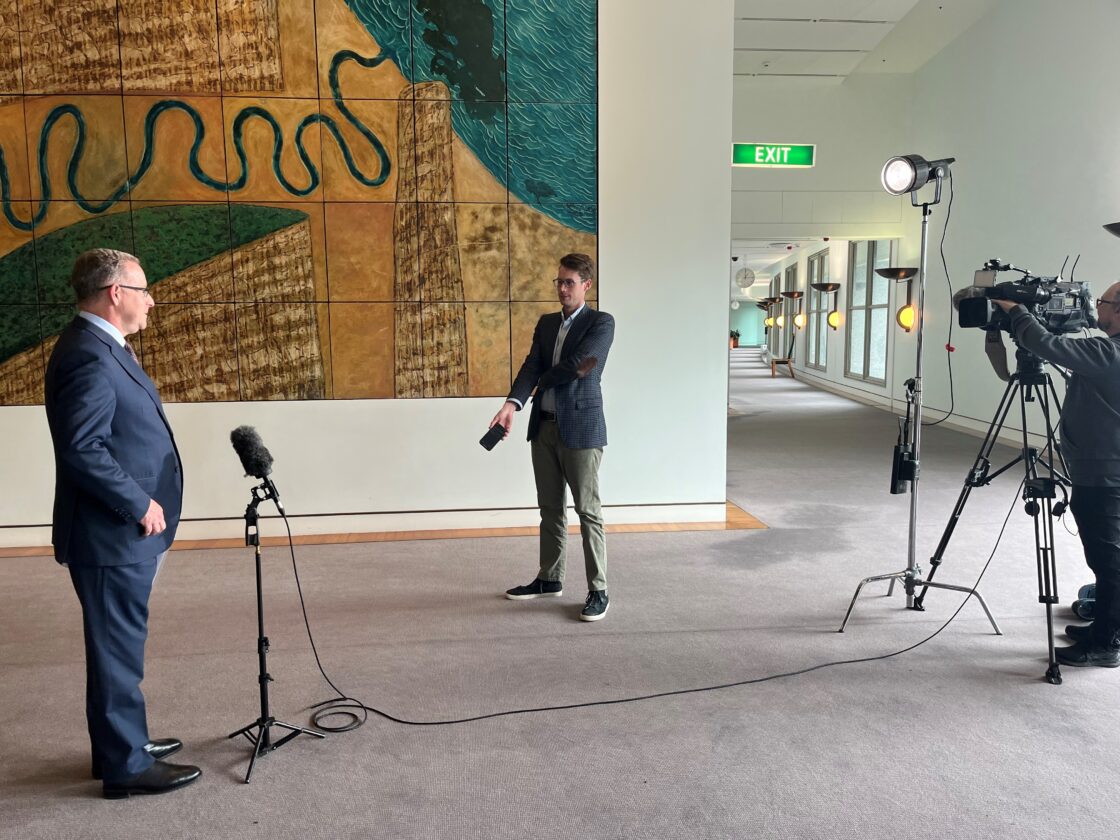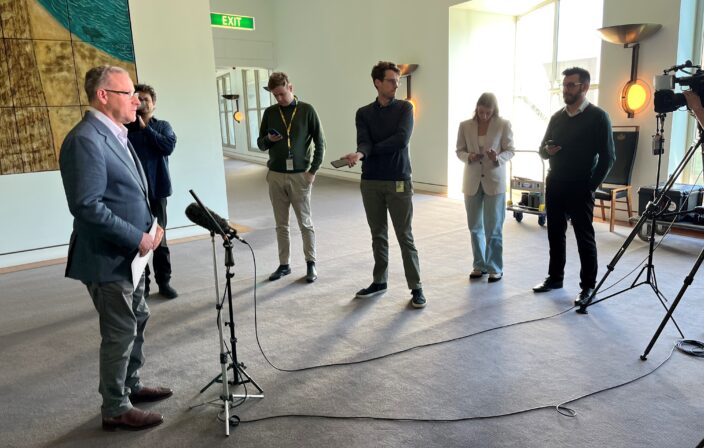ACCI responds to government action on CFMEU
17 Jul 2024
|Transcripts

Event: ACCI chief executive officer Andrew McKellar press conference at Parliament House, Canberra
Date: Wednesday 17 July 2024
Topics: CFMEU; US political and economic situation
E&OE
Andrew McKellar:
Alright, we’ll get started. So I just wanted to make a statement, a further statement today in relation to the CFMEU matters. I think the first thing to observe is that this situation is spiraling. It’s continuing to develop on a day by day basis. We’re seeing more evidence coming out and it’s likely that there will be further evidence coming to light in the coming days. So I think it is a very serious matter and something that warrants a very close attention and effective response from government at all levels. We heard what the minister had to say, we listened carefully to that and there are some important points that we agree with in terms of his assessment of the situation. We certainly agree that the general manager of the Fair Work Commission should be given the opportunity to take action here and to appoint independent administrators or an administrator.
So that’s something that certainly is an appropriate power that is there with the commission at the moment. We also recognise that the government has said that it will legislate if the Fair Work Commission encounters any barriers to that action. So that’s also appropriate and it’s appropriate that the government is coordinating with the AFP Commissioner and encouraging the AFP to coordinate closely with their state law enforcement counterparts. All of those things are good steps we would say they need to go further. There needs to be stronger action. Certainly deregistration of the CFMEU or the relevant constituent divisions needs to be on the table. That’s a sanction that needs to be there and if necessary, it should be applied. And beyond that, I would say that the most important thing here is that public confidence is restored. We need to see strong decisive action. We think that that needs to go further with a full transparent public inquiry with the powers of a Royal Commission.
Journalist:
Do you accept the minister’s explanation that deregistration lost its teeth because of the Work Choices changes and in fact would have no material effect on the CFMEU? So the course of action the government is taking according to Minister Burke is in fact tougher for deregistration.
Andrew McKellar:
Well, we certainly accept that the appointment of an administrator or administrators by the general manager of the Fair Work Commission, that is a tough sanction, but so is deregistration and the relevance of deregistration is not gone. It should be on the table. It certainly would make it more difficult for the CFMEU or certainly those contaminated parts of the CFMEU to discharge their function as they have been doing, pursuing strategies of coercion and intimidation in the system.
Journalist:
The minister says that the hierarchy of the party will meet tomorrow to consider the question of taking donations from the union going forward. Do you think there are any circumstances in which it is acceptable for federal Labor to continue to take money from the CFMEU while this kind of a cloud hangs over its behavior?
Andrew McKellar:
Well, I think those are questions for the organisational part of the Labor Party, but clearly public confidence is an issue here. And I think any major political party in Australia should question where those donations are coming from, whether there are links or potential links to organised crime, criminal activities and I think that’s a risk that they’ve got to assess for themselves.
Journalist:
The Fair Work Ombudsman is looking into some of the allegations, particularly in Victoria and EBAs entered into unwillingly or strong arming to get people into EBAs. But a lot of businesses I’ve spoken to have said that they are hugely fearful of putting their heads above the parapet because they saw during the Royal Commission, even though that the bad findings were made several years after the fact, they were finding themselves being retaliated against by the CFMEU. What does the government need to be doing to one, allow people to make complaints in a way that shields them and two, how to protect them from retaliation potentially months and years after the fact?
Andrew McKellar:
These are significant issues. There is a real risk of intimidation, coercion, retaliation for anybody in these circumstances. And I think there has to be the highest level of protection afforded under the law to honest, hardworking businesses that are just trying to contribute to the economy and don’t want to be confronted with these issues. So there need to be protections in place if we need to see further changes in the legislation, if we need to look at reversing the decision to dilute the powers that the ABCC had, putting it in under the Fair Work Ombudsman, you need a strong independent organisation regulator able to go out there and enforce these conditions and standards on the union and to have the power and the resources to back that up as well. That’s what the government needs to do. It was a terrible mistake to abolish the ABCC and they need to come up with a much better alternative than what they’ve got at the moment.
Journalist:
Does it concern you that the number of prosecutions against the CF… number of actions taken against the CFMEU have basically since the end of the ABCC have diminished to zero?
Andrew McKellar:
Absolutely. I mean, clearly there is a lot of evidence out there. We’re seeing media organisations digging up that evidence. At the moment. We’re not seeing it coming from the regulators. We’re not seeing it coming from the law enforcement authorities. We’re not seeing it coming from the commissions in each of the states. We’re seeing it coming through the media. So I think that is a very worrying sign that this evidence has been uncovered in the media, but we’re not seeing it generated through those channels where it should be possible to gather that evidence and take action.
Journalist:
On another topic. The International Monetary Fund now says interest rates will likely have to stay higher for longer because of the stubborn nature of inflation around the world. What does the business group draw from the IMF’s conclusions and how relevant do you think that they are to the Australian setting?
Andrew McKellar:
Well, I think they’re very relevant and this has been at the heart of the debate, the discussion over the state of the economy. We’re seeing that inflation in Australia has been sticky. We’re seeing that input costs for businesses have continued to rise. Wages have increasingly been part of that equation that’s keeping inflation above the target range that the RBA has. And for as long as that remains, it will be very difficult for the RBA to take the decision to start reducing interest rates. So that has to happen. We have to have a situation where inflation is getting back down into that target band for the RBA.
Journalist:
The Treasurer even hinted in a comment this morning that perhaps ongoing inflation might start to feed into job numbers that are out tomorrow and that they might not be as good as the government had hoped as a result. Is it fair for Federal Labor to put any adverse signs in job numbers down to those pressures?
Andrew McKellar:
Well, the labor market has been incredibly resilient. I think it’s fair to say that probably many commentators have been expecting the unemployment rate to be higher than where it is now. I think it’s a good thing that the labour market has been as strong as it has been and we hope that that can continue. But obviously in an environment where business is walking a tight rope, it’s going to be hard to sustain the strength in the labour market for a longer period.
Journalist:
And Andrew, I may one more, see if we can on the CFMEU, we’ve heard matters in Victoria, New South Wales, we’ve now got things arising in Queensland. Victorian branch issue will affect South Australia and Tasmania. The ACT is sitting like a little island in here. The Chief Minister in the ACT has said nothing to see here. What are you hearing from your branch here? And its members, certainly the Master Builders in the ACT have said no, the problem spreads to the ACT as well. What are you hearing?
Andrew McKellar:
Look, I think what we’re seeing is that this is a multi-headed hydra. There are problems in every state and territory, most likely. I don’t think it can be swept under the carpet in any jurisdiction. It has to be taken seriously. And that’s one of the reasons why we are looking for the federal government to take a lead on this and ensure that the states are moving quickly, that there is the corporation with the state commissions, the corruption commissions, and also the law enforcement authorities. But they need to go beyond their public confidence is paramount in this. And at the moment, the public has no reason to be confident that we are getting to the bottom of this anytime soon. Thank you. Thanks very much.


